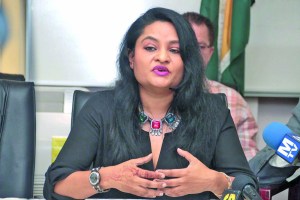…says Guyana needs all the help it can get against COVID-19
Rated as one of the least prepared countries for COVID-19, Guyana needs all the help it can get. But the country did not benefit from the first tranche of funds from the World Bank and it is felt by some that the political instability may be affecting Guyana’s chances.

In an interview with this publication, People’s Progressive Party (PPP) Executive, Dr Vindhya Persaud expressed concern over the lack of a stable Government and the harm this is doing to the country’s ability to access help.
It has been over two weeks since Guyana requested help in the form of funds from the World Bank. That help has so far not been forthcoming, with Prime Minister Moses Nagamootoo confirming a few days ago that the World Bank was still “processing” the request. Meanwhile, Guyana’s coronavirus cases continue to rise.
“Definitely we are in a state where we need so much more to address the needs of the citizens. Because what we’re seeing is poor handling of the COVID crisis in Guyana. There is a lack of testing. There is controlled testing being dictated by the Minister. And also, poor dissemination of information, not only to the healthcare system, but also to the public which is resulting in a risk situation for the country,” she told this publication. According to her, in addition to the mismanagement of this entire situation by the Government, “we are being excluded from [international help]. The political situation isn’t helping, because we have been in limbo for the longest while and because of the illegalities that have been causing serious questions to be raised around the world.”
Persaud, who is on the National COVID-19 Task Force set up by the PPP, pointed to the outpouring of statements from countries and international organisations, which have criticised the lack of transparency in the electoral process and have even threatened sanctions if an illegitimate President is sworn in.
“Many statements addressing this, by countries, by organisations as to the political scenario may have had an impact on the World Bank’s decision to not include us in this first tranche that we badly needed when we cannot adequately and we have not been meeting the needs of the population as we deal with COVID-19,” Dr Persaud added.
She pointed out too that, “not only in health care, but in other areas where we will see the effect of COVID-19, if it hasn’t already made an impact. Areas like jobs and job security, socio-economic areas, as well as food and food security. Medication. These are things that will be sorely needed. And we don’t see plans from the Government to address these key and critical areas.”
The International Monetary Fund (IMF) had released an assessment in which it ranks Guyana among the few countries in the region least prepared to deal with the effects of the coronavirus pandemic, particularly the negative impact on the economy and tourism.
Guyana is in the red when it comes to coronavirus preparations. In the assessment, the IMF rated countries in the Americas from red (least prepared) to green (most prepared). Countries like the United States and Canada are in the green zone.
However, Guyana, Guatemala, Belize and Honduras were not so lucky. Neighbouring Brazil was considered more prepared than average while countries like Colombia were rated as less prepared.
According to the IMF, the virus is likely to have an immediate economic impact in the Region, causing, among other things, financial restrictions, declining commodity prices, and reduced tourism.
Guyana had approached the World Bank last month for a US$5 million loan to tackle the coronavirus, which has so far claimed four lives and infected 31 locally. Guyana is in a tricky situation, however, having conducted elections over a month ago with a winner yet to be announced.
The majority of observers who scrutinised the tabulation process has pronounced it to have not been credible. The international community has warned Guyana that it could be isolated and even sanctioned if a President is sworn in on the basis of the flawed results, resulting in an uneasy standoff between the international community and the Government.
Discover more from Guyana Times
Subscribe to get the latest posts sent to your email.













